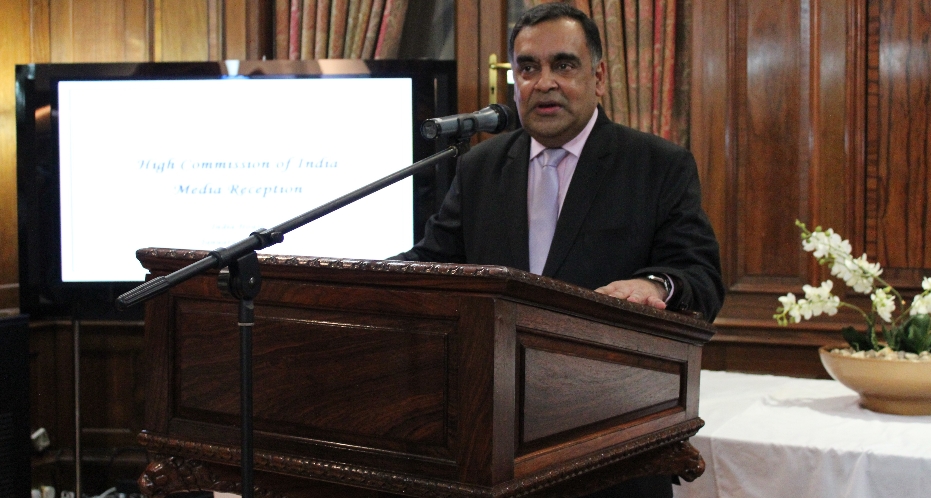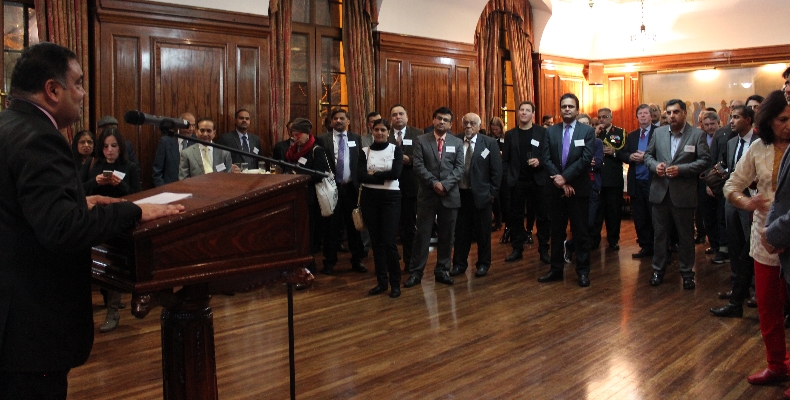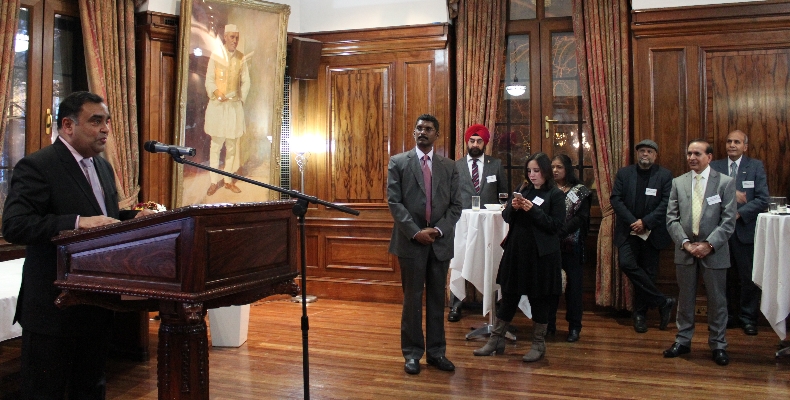Driving commercial and political engagement between Asia, the Middle East and Europe
Driving commercial and political engagement between Asia, the Middle East and Europe
Driving commercial and political engagement between Asia, the Middle East and Europe

The new High Commissioner of India to the UK H.E. Mr. Yashvardhan Kumar Sinha has said that Brexit is a challenge but “India sees it more as an opportunity” and that these are “exciting times for UK-India relations.”
Mr Sinha, who has been in his post six weeks, made the remarks during his first media reception for journalists, which was held at India House in London on Monday night.
“Indian corporates and the Indian community are looking forward to engaging more closely with their British counterparts,” he added.
He did not publicly comment on any India-UK FTA during the speech, which he made hours before UK Prime Minister Theresa May made an historic Brexit speech at Lancaster House in London on Tuesday, in which she outlined her vision for Britain’s exit from the EU revealing that the UK would leave the EU single market.
Approximately 80 journalists from Indian and British media attended the reception to welcome Mr Sinha to the UK.
Mr Sinha was previously High Commissioner of India to Sri Lanka. “I arrived when the holiday season was about to commence which gave me the time to relax and read about my assignment,” he said.
The 58-year-old, who is married with two sons, said so far his time in the UK had been a “steep learning curve” but it was “exciting times for UK-India relations.”
“We have a long shared history, a shared commitment to democracy and a vibrant and robust Indian community here,” he said.
He then went on to highlight the “very good economic engagement between India and the UK.”
“We have a US$14 billion bilateral trade in goods and a further US$5 billion bilateral trade in services. The UK is very important for investments too. The UK is the largest G20 investor in India and the third largest inward investor in India, after Mauritius and Singapore.”
The UK accounts for around eight per cent of all FDI into India for the period April 2000 – September 2016 and India is the third largest inward investor in the UK.
The 1981 batch Indian Foreign Service officer pointed out that more than 800 Indian-owned companies operate in the UK paying £650 million in corporation taxes and employing more than 100,000 people.
“Our two governments have set ambitious targets to see how we can further enhance this,” Mr Sinha, who met Mrs May during her trip to India last year, said.
Mr Sinha, who has a Masters in History from Delhi University, said it was in that context that his mission in the UK “was important.”

High Commissioner of India H.E. Mr Y.K. Sinha tells the gathering of journalists: “The media does not pay enough attention to the UK-India relationship.”
The fact that Mrs May’s visit to India in November 2016 was her first trade mission outside the EU was “significant,” he said.
Mrs May inaugurated the India-UK Tech Summit in Delhi with Indian Prime Minister Narendra Modi.
The trip resulted in over £1 billion worth of deals, he pointed out. These included an announcement that Dyson would open flagship stores in major cities across India and that King’s College Hospital, Ernst and Young UK and Pricewaterhouse Coopers, along with other leading UK health providers, had signed a range of commercial and financial partnerships with the Indo-UK Institute of Health (IUIH) worth £300 million.
“We have these natural advantages which we need to build upon,” he said. “The media does not pay enough attention to the UK-India relationship,” he said speaking to representatives from The Guardian, The Times, the BBC, The Hindustan Times, The Hindu, Asia House, Press Trust of India and others at the event.
“I have seen too many negative stories coming out about India and yet India is the fastest growing large economy in the world and so much has happened between 2014 and 2016,” he said. Mr Modi took the helm in 2014 following a landslide victory in the general election.
“There are so many positive stories and that is something we need to highlight,” he said referring to how between 2000 and 2015 the value of UK FDI into India was estimated at US$22.2 billion. The value of Indian FDI into the UK has experienced a notable increase between 2004 and 2013, from £164 million to £1.9 billion.
“It is important for people to know about these positive stories and that will help ensure both communities in each country take advantage of the situation that exists. My mission is to consider how we can do that and I need your advice as to how to do that. We want to do outreach to the media as much as possible and be as open as we can,” he added.
He then went on to say that UK-India engagement was not limited to trade but was “across the board.”
“In R&D for example, India and the UK and India have a very strong relationship,” he said, mentioning the Newton-Bhabha Fund, which aims to bring together the UK and Indian scientific research and innovation sectors to find joint solutions to the challenges facing India in economic development and social welfare.
But he pointed out the number of Indian students in the UK had dropped from 40,000 in 2010 to 19,000 in 2016 and compared this to Australia where the figure of Indian students had risen from 19,000 in 2010 to 40,000 in 2016 and the US which had seen a spike from 104,000 to 166,000. “The UK has always been the first preference for Indian students,” he said.
The Post-Study Work Visa, which had allowed Indian students to work for up to two years after completing a degree in Britain, was discontinued in 2012 causing a huge fall in the number of Indian students applying to British universities. Mr Modi had clearly hoped Mrs May would relax immigration rules for Indian students and IT professionals when she visited India last year and it is thought this would be a vital part of any future bilateral free trade deal.
Whilst Mrs May did not agree to relax the rules on that trip, she said the UK might increase the visa quota if it could step up the speed and volume of returns of Indians with no right to remain. She also announced smoother visa procedures for Indian business travellers and high-net worth individuals.
But many Indian students are opting for mainland Europe nowadays, Mr Sinha said. Germany now has 10,000 Indian students a year and France has 5,000 a year, he said, adding that both countries were actively recruiting on campuses.
“We need to see how we can ensure the UK attracts students from India and both Governments are talking to each other and engaging,” he added.
India’s IT professionals have also been affected by new immigration rules and their movement within Europe will be affected once the UK leaves the EU single market. From April 6 2016 new rules stated that nationals from outside the EU living and working in Britain on a Tier 2 skilled worker visa must earn at least £35k to settle here after living here five years. Earlier the settlement salary threshold was £21k.
“If we look at IT, the UK is the first port of call in Europe for Indians,” Mr Sinha continued, saying that the English language and other commonalities attracted Indians to Britain. “It is very important that our IT professionals can come here and work and go back and they will contribute a lot to the local and global community so I think it’s very important that both countries engage in a manner that would be good for India and the UK,” he said.

High Commissioner of India, H.E. Mr Y.K. Sinha, says: “I remember coming here 54 years ago. I got off a boat at Liverpool and I never dreamt then that I would come back 45 years later as the High Commissioner.”
“If you look at the deals signed during May’s visit the conversations between both countries are very encouraging,” he continued.
He then pointed out the UK-India relationship was far more than trade and that 2017 was the UK-India Year of Culture – a year-long programme to celebrate the 70th anniversary of Indian independence and UK-India cultural ties, as announced by former UK PM David Cameron during Narendra Modi’s visit.
“2017 is the year that marks 70 years of Indian independence. We will be making a joint announcement shortly about these events,” Mr Sinha said. In a nod to India’s passion for cricket, he said: “We are very keen to do something on cricket in the UK during the course of this year.”
At the age of four he lived in the UK for a year and went to school in Chesham in Buckinghamshire. Hailing from Bihar, he was later educated at St Michael’s High School in Patna.
Mr Sinha told the gathering: “I remember coming here 54 years ago. I got off a boat at Liverpool and I never dreamt then that I would come back 45 years later as the High Commissioner.”
He succeeds H.E Mr Navtej Sarna who was appointed as the Indian Ambassador to the US in September 2016 after serving in London just nine months.
“We hope we can further enhance and improve our bilateral relationship,” he concluded.
naomi.canton@asiahouse.co.uk
To read an interview with H.E. Mr Navtej Sarna that he gave when he was Indian High Commissioner to the UK click here.
To read an interview with the British High Commissioner in India Sir Dominic Asquith KCMG click here.
To read other stories about India on the Asia House website click here.
